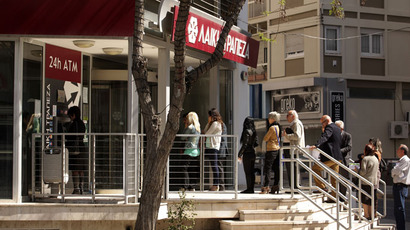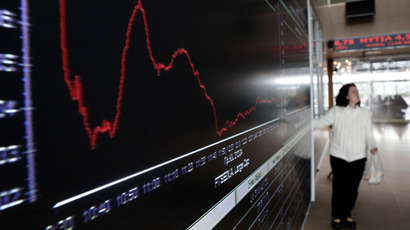Multibillion-euro bailout best solution for Cyprus?
EU finance ministers finalized the Cyprus rescue deal on Friday, while the country revealed that the cost of the bailout had risen by several billion euros. But some EU nations argue that taxpayers should not bear the burden of national debt.
Cypriot President Nicos Anastasiades will appeal to EU chiefs
for extra assistance for the island nation as it faces ever more
crippling terms for its eurozone debt bailout, he said on
Friday.
The meeting in Dublin, which is expected to reveal the terms of the Cypriot bailout, comes just a day after the cost of the rescue package jumped from €17 billion to €23 billion. Officially, the rise is due to delays in securing the deal. However, some say that the increase is because billions of euros have been taken out of the country’s shuttered banks both illegally and through loopholes.
According to the bailout draft leaked on Thursday, the International Monetary Fund will provide €1 billion, the eurozone will pay €9 billion, and the island itself will generate €13 billion. The news sparked another wave of uproar among Cypriots and those with deposits in Cypriot banks, who fear that the rise in the cost of the bailout may result in further cuts to their accounts.
Earlier, authorities announced that personal deposits in Cypriot banks would be cut in order to rescue the country’s collapsing economy. However, they later backed down and resolved to only impose a financial burden on deposits of €100,000 or more.
On March 30, it was announced that major depositors at the Bank
of Cyprus would see 37.5 percent of their deposits converted into
bank shares, with the figure possibly set to increase by another
22.5 percentage points if the bank required further injections of
cash.
Since Bank of Cyprus will also absorb the island’s second-largest bank Laiki, the same conditions are likely to apply to Laiki Bank depositors as well. With the debt €6 billion higher than expected, smaller depositors fear for their savings as well.
The Icelandic model: An alternative path for Cyprus?
Iceland’s example shows that a multibillion-euro bailout and penalties to personal savings are not the only way to save a struggling economy.
Five years after virtual bankruptcy, Iceland’s economy is growing rapidly. In 2008, the island nation's banking sector collapsed, but taxpayers refused to bear the expense, and called for an investigation instead.
The country conducted a national referendum that showed that the overwhelming majority of Icelanders was against full reimbursement of the debt caused by the crisis. Iceland chose to let its banks fail and nationalized them, and imposed strict capital control measures. Two years after the collapse, the country’s economy was back on its feet.
Cyprus should follow Iceland’s example, and in order
to do so it must first quit the eurozone, Bruges Group chair Robert
Oulds told RT.
“They [Iceland] are actually well on the road to recovery and they are doing relatively well, whereas countries that have remained in the euro are suffering,” he said, adding that getting out of the euro would not be the end of the world for Cyprus.
Jack Rasmus, a professor of political economy, explained that that the only way to deal with a banking crisis, like the one in Cyprus, is to follow the example of Iceland and put the banking system in the public sector.
“The lesson is you need a public banking system to shield the credit markets, the consumer credit markets from all this speculation going on, which has been wrecking the global economy now for a decade,” he told RT.














